A quarter of Britons arriving from amber-listed countries failed to follow isolation rules, according to official estimates.
Some 23 per cent of amber arrivals in England in July either avoided staying at home when they were supposed to.
Another 9 per cent did not take the required Covid tests when they arrived in the country.
There are no routine Government follow-ups to check whether UK arrivals completed a mandatory PCR Covid test within 48 hours of arriving in the country.
They are provided by private companies, with some charging more than £100 per test.
But those coming into the UK must provide proof they purchased a test on the passenger locator forms required to get into the UK, which has caused chaos at border force in major airports.
The Office for National Statistics found compliance with the rules was lowest among those aged 18 to 34-years-old and highest among those who had not been jabbed.
It surveyed 848 adults arriving in England from amber territories between July 12 and 17.
Separate figures from the ONS revealed about half of Britons are not fully behind the strict travel testing requirements.
Just 53 per cent of UK residents returning to the country after a holiday said they thought a Covid test was ‘very important for safety’.
A further 34 per cent said they thought the tests were ‘quite important for safety’, while 11 per cent said the tests were not important.
Only around three in five respondents (49 per cent) said they fully understood the rules around quarantine.
The remaining 41 per cent said they had either misunderstood or were unsure of them.
Ministers have been accused of seeding confusion with the constantly changing amber list and uniquely strict testing requirements.
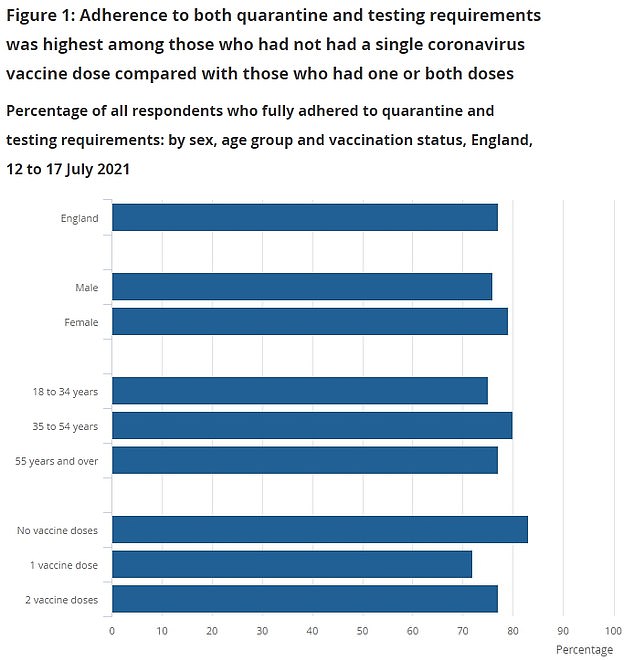
Overall, just 77 per cent of people said they followed both isolation and Covid testing rules. Women were more likely to follow the rules than men, while those aged 18 to 34-years-old were the least compliant. And those who had not received a Covid jab were more likely to comply with requirements, compared to those who had been vaccinated
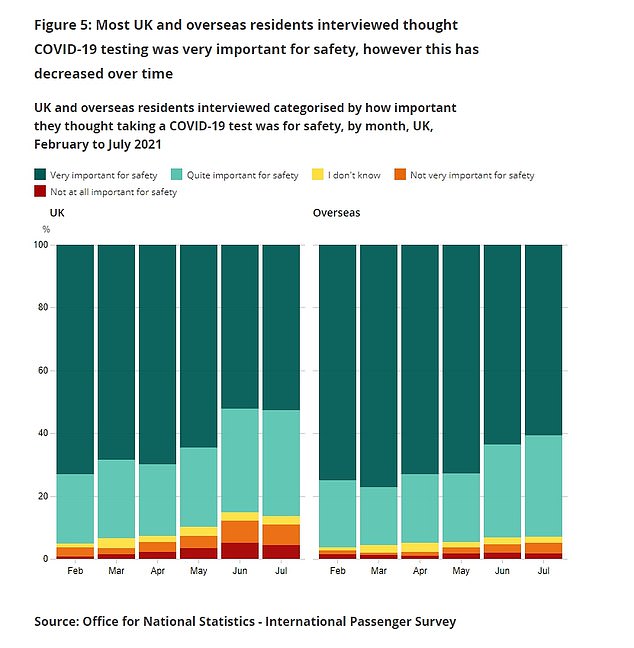
In February, 73 per cent of Brits fully backed the Covid tests for travellers arriving in the UK, but this dropped to 52.7 per cent in July – the most recent data figures are available for (graph, left). Meanwhile, 75 per cent of overseas residents arriving in the UK believed the tests were ‘very important for safety’ at the beginning of the year, which reduced to 60.6 per cent in July (graph, right)
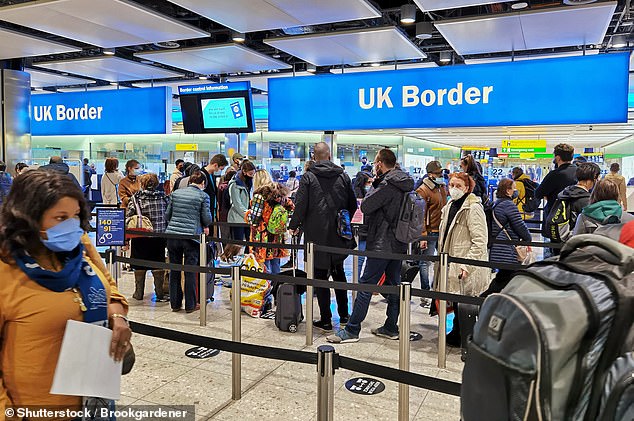
The UK has different testing and quarantine rules in place for arrivals, depending on their vaccination status and whether they spent time in green, amber or red-listed countries. Approval of the testing regime has dropped markedly among both UK and overseas residents since the beginning of the year
Overall, just 77 per cent of people said they followed both isolation and Covid testing rules, down from 82 per cent one month earlier.
The UK has different testing and quarantine rules in place for arrivals, depending on their vaccination status and whether they spent time in green, amber or red-listed countries.
Everyone travelling into the UK must take a Covid test within three days before they arrive.
Arrivals from amber-listed countries – which include France, Portugal and Spain – must take a test within two days of arriving in the country.
And those who are not double-jabbed must also take a test after eight days in the UK and quarantine at home for 10 days.
Those who break the rules face a fine of £1,000 which can be increased to £10,000 for repeat offences.
Women returning from amber-listed countries were more likely to follow Covid requirements (79 per cent) than men (76 per cent), the ONS found.
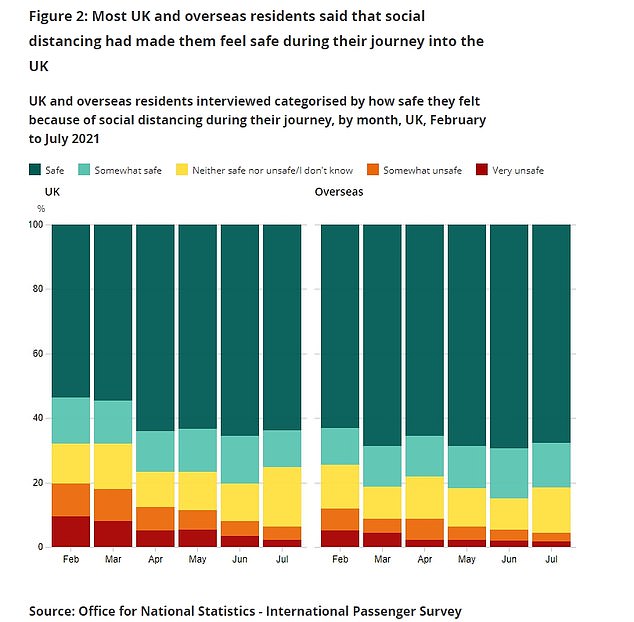
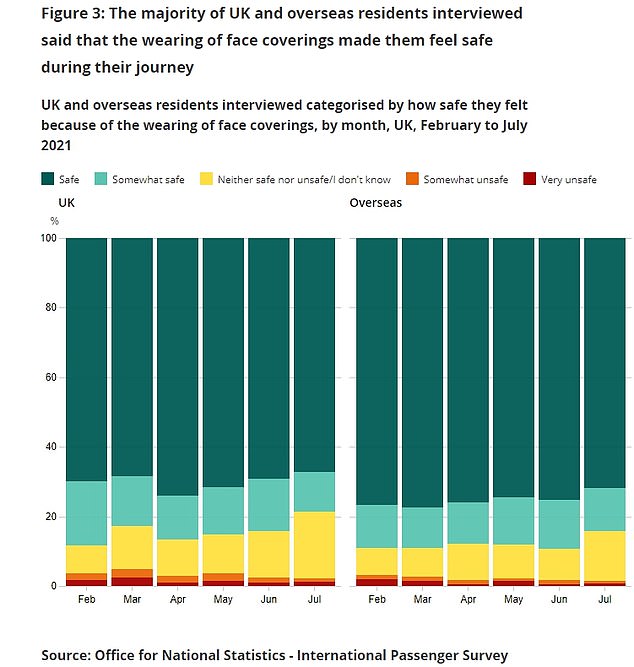
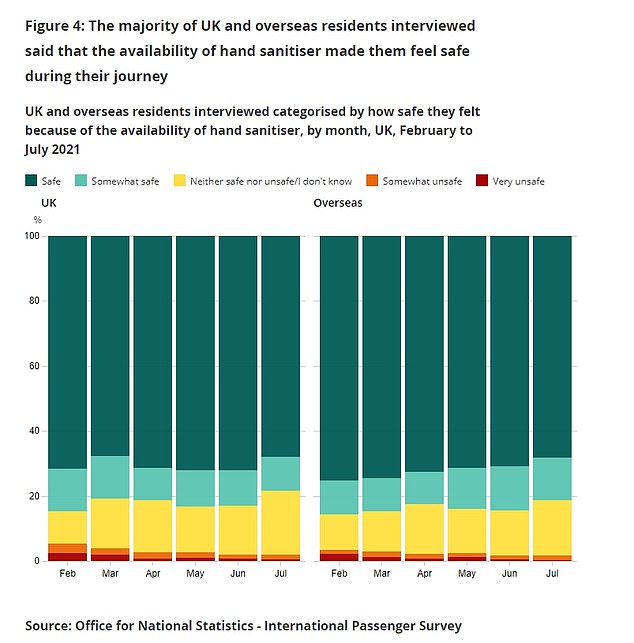
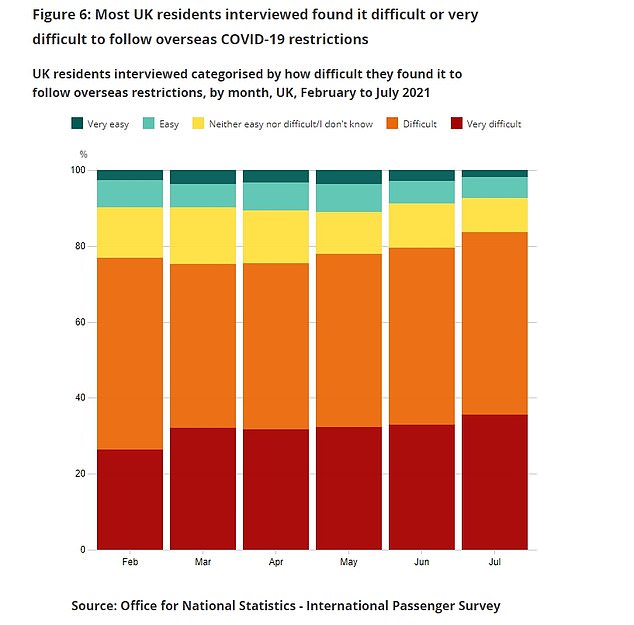
Those aged 18 to 34-years-old were the least compliant age group (75 per cent) when compared to those aged 35 to 54 (80 per cent) and those over-55 (77 per cent).
Inside Britain’s ‘Wild West’ travel testing regime
Britain’s wild west PCR testing for travel regime where swabs that were supposed to cost £2 actually sold for more than £100 was caused by a lack of regulation, industry experts have claimed.
In one of the most embarrassing moments of the testing fiasco, the Government last month had to change a company’s £1.99 listing on its website showing approved PCR testing providers to show that its kits actually cost £117.
And insiders say the broken system was caused by experts pushing for more expensive PCR tests as a requirement for travel, the decision to allow private providers to sell the tests and a lack of oversight on the Government’s part to prevent middlemen companies profiteering.
Minister have only recently moved to tackle the market — dropping the cost of their own Covid tests by a fifth in the hope private firms will follow.
Health Secretary Sajid Javid admitted the Government’s own costs were too high and said its single post-holiday PCR test package will fall from £88 to £68. A two-swab NHS Test and Trace package will be cut from £170 to £136.
Mr Javid also accused some private testing firms of ‘acting like cowboys’ by advertising misleading prices on the Government website and vowed to boot them off within days.
But the changes were dismissed by the travel industry, with bosses saying the price cuts amounted to ‘tinkering’.
The head of Gatwick Airport said testing should be removed altogether for the double vaccinated to restore ‘shattered’ passenger confidence and help the industry through a desperate time.
Advertisement
And people who had not received a single vaccine followed Covid travel rules (83 per cent) more than those who had one (72 per cent) or both doses (77 per cent) of the vaccine.
Meanwhile, separate ONS data from revealed public approval of Covid tests for travel has fallen compared to earlier this year.
In February, 73 per cent of Britons fully backed the tests, but this dropped to 64.5 per cent by May and reached a low of 52.7 per cent in July – the most recent date figures are available for.
When the ONS launched the survey, just 3.7 per cent of people living in the UK said the tests were ‘not at all important for safety’ or ‘not very important for safety’.
But nearly three times as many people – 11 per cent – disapproved of the tests by July.
And attitudes among overseas residents followed a similar decline.
At the beginning of the year, 75 per cent of people living abroad who arrived in the UK believed the tests were ‘very important for safety’.
But this dropped to 73 per cent by April and reached a low of 60.6 per cent in July.
In February, just 2.8 per cent of those living outside of the UK said the tests were ‘not at all important for safety’ or ‘not very important for safety’, but this nearly doubled to 5 per cent by July.
Britons and overseas residents continued to support other Covid restrictions during travel.
Around six in 10 people in both groups said social distancing made them feel safe during their journey. And about two-thirds said wearing face masks and the availability of hand sanitiser made them feel safe.
These figures have stayed largely stable since the ONS began its survey in February.
The vast majority (86 per cent) of Brits said they found it ‘difficult’ or ‘very difficulty’ to follow Covid restrictions when getting back to the UK, an increase from 75 per cent in March.
But conversely, 95 per cent of overseas residents arriving in the UK said they understood Covid restrictions ‘very well’ or ‘quite well’.
Source link : https://www.dailymail.co.uk/news/article-9962559/A-quarter-arrivals-amber-list-countries-broke-Covid-rules.html











